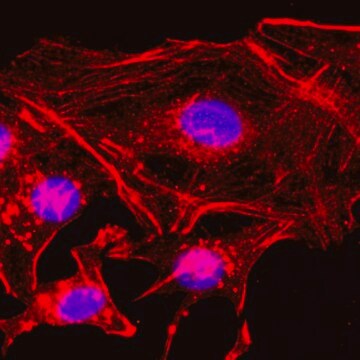SAB1305567
MONOCLONAL ANTI-BETA-ACTIN antibody produced in mouse
clone 8H10D10, crude ascites, buffered aqueous solution
Synonym(e):
ACTB, Actin, cytoplasmic 1, Actin, cytoplasmic 1, N-terminally processed, Beta-actin
About This Item
Empfohlene Produkte
Biologische Quelle
mouse
Antikörperform
crude ascites
Antikörper-Produkttyp
primary antibodies
Klon
8H10D10, monoclonal
Form
buffered aqueous solution
Mol-Gew.
41737 Da
Speziesreaktivität
human
Methode(n)
immunohistochemistry: 1:10-1:50
western blot: 1:5000-1:20000
NCBI-Hinterlegungsnummer
UniProt-Hinterlegungsnummer
Versandbedingung
wet ice
Lagertemp.
−20°C
Posttranslationale Modifikation Target
unmodified
Angaben zum Gen
human ... ACTB(60)
Allgemeine Beschreibung
Anwendung
Biochem./physiol. Wirkung
Physikalische Form
Haftungsausschluss
Sie haben nicht das passende Produkt gefunden?
Probieren Sie unser Produkt-Auswahlhilfe. aus.
Empfehlung
Lagerklassenschlüssel
12 - Non Combustible Liquids
Flammpunkt (°F)
Not applicable
Flammpunkt (°C)
Not applicable
Analysenzertifikate (COA)
Suchen Sie nach Analysenzertifikate (COA), indem Sie die Lot-/Chargennummer des Produkts eingeben. Lot- und Chargennummern sind auf dem Produktetikett hinter den Wörtern ‘Lot’ oder ‘Batch’ (Lot oder Charge) zu finden.
Besitzen Sie dieses Produkt bereits?
In der Dokumentenbibliothek finden Sie die Dokumentation zu den Produkten, die Sie kürzlich erworben haben.
Unser Team von Wissenschaftlern verfügt über Erfahrung in allen Forschungsbereichen einschließlich Life Science, Materialwissenschaften, chemischer Synthese, Chromatographie, Analytik und vielen mehr..
Setzen Sie sich mit dem technischen Dienst in Verbindung.